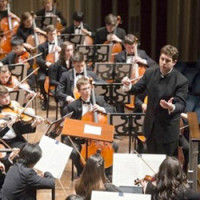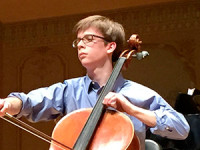by Jeremy Reynolds and Mike Telin
After conduct
Jeremy Reynolds: You’re headed a long way from home! Have you or any of your students ever been to China?
Brett Mitchell: Actually, the only place I’ve ever been in Asia is Tokyo. But we have a good number of kids from China. Our concertmaster for the tour is originally from China, and he’s the best musician for that job.
This is my first tour as a music director, though I’ve done plenty of tours as a staff conductor. I’ve been on the road with all of the orchestras where I’ve served as assistant conductor: the Houston Symphony, the French National Orchestra, and of course, The Cleveland Orchestra. I’m on the road all the time with Cleveland. But this is my first journey as a director, so it’s very exciting for me personally as well as for the group.
JR: Do you speak Chinese?
BM: (laughs) No. I have a good, solid grasp of a half-dozen languages, but I’m really going to be relying on some of our kids and the translators to help us get around. I’m going through my phrase book, but that’s about as far as I’ll get.
JR: Do you have any time to be tourists?
BM: One of the really great things about this tour is that we have some built in sightseeing time on the itinerary. We’ve been working with a classical music touring company [Classical Movements, Inc.] that specializes in getting orchestras from one place to another and booking concerts for them. The Minnesota Orchestra just went to Cuba — obviously, that was a big deal — and we’re using the same company.
JR: What will you see?
BM: We’re going to go to the Great Wall and the Temple of Heaven. Classical Movements, Inc. has done a really great job of putting together exciting things for us while leaving us enough down time. Even on concert days we’ll be out and about. It defeats the purpose to go all the way to the other side of the Earth and not get out to experience that amazing culture.
JR: How do you think the students will hold up? Touring can be really draining, even for professional orchestras.
BM: Yes, it can. My dad is originally from London, so I’ve been travelling overseas for most of my life, and I’m relatively used to it. But if you’ve never experienced serious jetlag — like when you travel to the other side of the planet — it can really throw you for a loop. We’ve got a little bit of time once we arrive for everybody to recoup before our first rehearsal, but then we have four performances spaced over five days. That’s fatiguing for the brass and wind players and just as exhausting for the string players. Maintaining stamina will be our biggest challenge — making sure we’re being smart and not spending our entire allowance the day we get it. I’ve been talking to them about this in rehearsals to make sure everyone understands how important it is to play smart.
JR: What factors influenced your musical selections?
BM: There are two things that I really want us to do on the road. The first is to play standard repertoire so that the audiences can gauge the quality that we are bringing to the table — it doesn’t get much more standard than Tchaikovsky’s fourth symphony. I would say that Shostakovich’s Festive Overture is also very standard. My other goal is to serve as musical and cultural ambassadors from Cleveland, Ohio in the United States of America. The piece we’re playing by the American composer Samuel Barber (Medea’s Dance of Vengeance) is going to be an unfamiliar piece for the audiences over there. To be able to say, ‘We are a young, American orchestra, and we’re going to play some phenomenal American music for you’ is a real tour de force. It requires a ton of virtuosity. Even though the audience won’t know the piece, they’ll certainly be able to see how skilled our young musicians are and get a good sample of American music.
JR: What about Wojciech Kilar’s Orawa?
BM: Kilar was a Polish composer, and, in fact, he only died about a year and a half ago. This is a piece for the string section only, and part of that is a practical concern. The Tchaikovsky, Shostakovich, and Barber are all huge challenges for the brass in particular. We needed a little more music on the program, and I couldn’t in good conscience give the brass more to do. Orawa was on the program of the very first concert I gave as music director with the orchestra two seasons ago. Every time I conduct this piece it gets reviewed as ‘the surprise hit of the concert!’ It’s got a lot of energy, and our kids sound phenomenal when they play it.
JR: On a more personal note, I understand your contract with The Cleveland Orchestra has just been extended?
BM: I was appointed Associate Conductor as of this past fall. I was assistant conductor for my first two seasons with them, and they asked me to stay for another couple of seasons and offered me a promotion. It’s such a thrill to be with The Cleveland Orchestra. I still pinch myself. It’s a ton of work, but what more could you want than to be affiliated with this fabulous, fabulous orchestra?
JR: Well, congratulations, and ‘break a leg’ on the tour.
BM: Thanks! We’re very excited.
A conversation with Henry Shapard
Mike Telin spoke
Mike Telin: What do you know about the concert halls?
Henry Shapard: Getting acquainted with new halls is one of the most exciting challenges. I and a few other COYO members have done some research, and the halls are all very high quality and were all built fairly recently, which is a good thing in terms of acoustics. I’m not sure if they will be as flexible as Mixon Hall at CIM, but at the same time, I’m optimistic that they won’t be totally dry.
It’s comforting to be playing in an emerging classical music market. There is a lot of pessimism surrounding American classical music today and to get to go to a place where it is completely fresh is exciting. And to get to play pieces like the Barber. Mr. Mitchell has mentioned that very little Barber, if any, is ever played in China, so to be able to unwrap that musical present for our audiences is something we are happy to be able to do.
MT: Will you have time to socialize with young Chinese classical musicians?
HS: I really don’t know, but I do know that we have a busy schedule. We’re playing in four distant cities in five days, so we will be doing a lot of moving around. But my hope is that even if we aren’t interacting directly, we will communicate a youthful energy that will be attractive to aspiring music students.
MT: How soon will you leave after Sunday’s send-off concert?
HS: We’ve been advised to have our bags packed by Saturday afternoon because there is a rehearsal on Sunday, and then the concert later that afternoon, and we have to be at the airport at 7:45 Monday morning.
MT: Did you get any packing advice?
HS: We were told to bring just enough clothing to get around. The men were advised to bring two tux shirts because we will not have access to laundry.
MT: How difficult was it to prepare all of the paperwork needed for international travel?
HS: We are fortunate to not only have committed parents, but also that The Cleveland Orchestra and the Youth Orchestra staffs have been on top of everything throughout the whole process. I know it is very complex to apply for visas: some of us have work visas and some of us have tourist visas, but thanks to all of the staffs’ efforts all we have to do is to get on the plane.
I asked Shapard to give me his thoughts about the tour repertoire.
Shostakovich, Festive Overture: This piece appeared on the first concert we ever performed with Mr. Mitchell.
Kilar, Orawa: It’s fun to play because it is for strings only, and one thing that people often say about COYO — and perhaps I’m tooting our own horns a little bit — is that our string section is fantastic. It’s a piece we know very well because we have trotted it out many times. It’s fun to be able to dig deeper into the work. To be playing Polish music in China is an interesting juxtaposition of cultures.
Barber, Medea’s Dance of Vengeance: I think this is going to show COYO at our best. Having gone on the European tour with the orchestra, I find that when you spend more than a week with the same group of people you get to know members of the sections you didn’t know very well before. Getting to spend time with the oboe and English horn players makes it more meaningful when you hear them playing extended solos in performance. It’s about being part of the team.
Tchaikovsky, Symphony No. 4: This is one of the most wonderful pieces I’ve ever played during my time with COYO. There are pyrotechnics in the strings, lyrical wind passages, and great brass parts. It’s wonderful to play. My hope is that when we finish playing it at each concert, people will know how great it is not only to be part of COYO, but also to be connected to The Cleveland Orchestra.
Published on ClevelandClassical.com June 8, 2015.
Click here for a printable copy of this article



